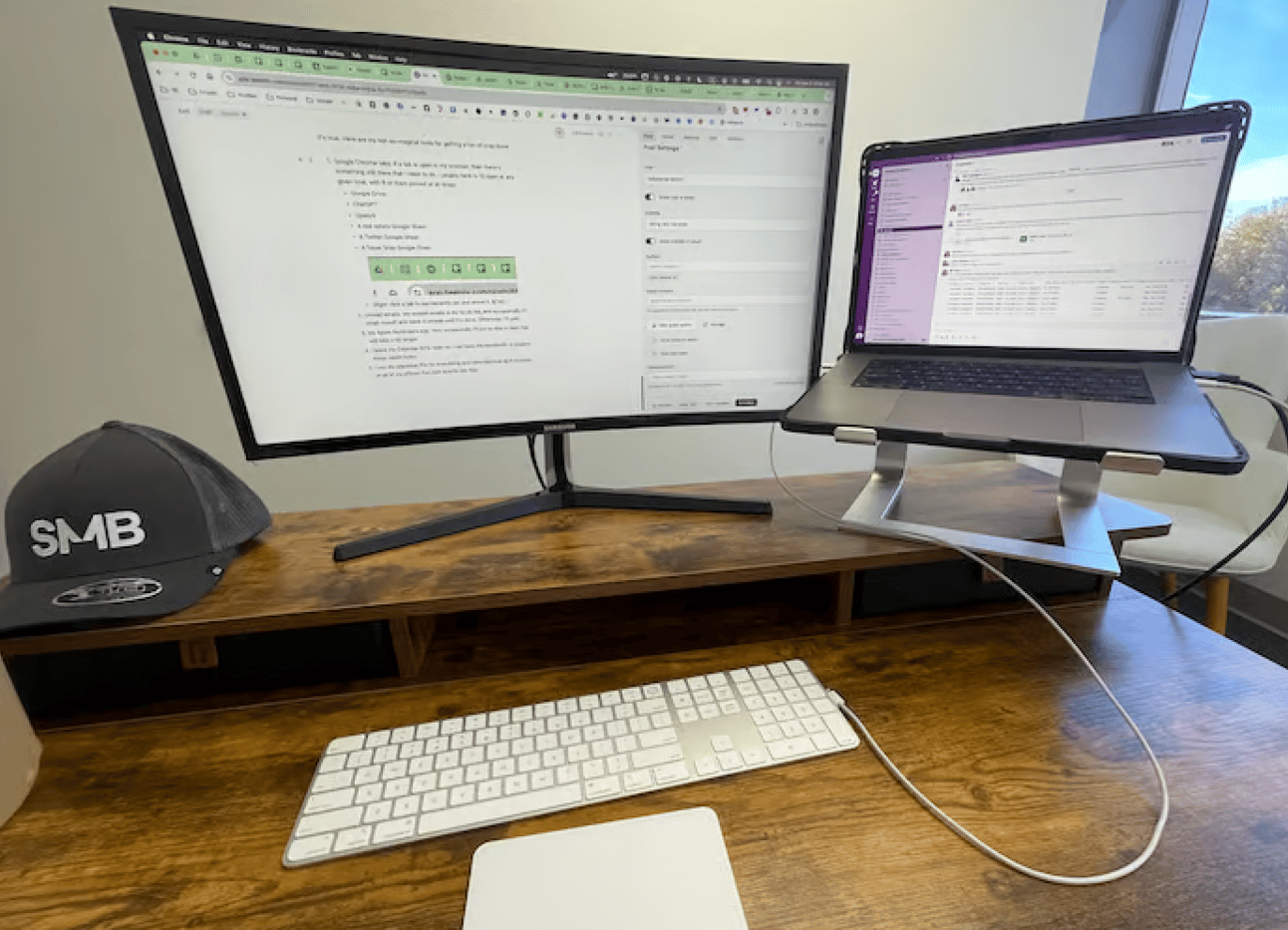Happy Monday!
I firmly believe that 90% of humans only operate at 20% capacity. If you’re in that 90%, my goal is for you to be closer to the 10% by the end of this email.
Why would anyone want to operate closer to 100% capacity? Because it makes life more fulfilling. Period. End of story. I’ve been on both sides of this argument.
This isn’t a hustle porn-pump-you up-to-work-18 hour-days-email. This is an email intended to help you suck the marrow out of life so you can get more done and enjoy the ride even more.
Before I get into this, a couple housekeeping items:
I’m thinking of starting a community for all things business growth and startups. But I’d first like to know what features you’d want in there! Can you please answer this 2 question poll really fast with a couple clicks?
My email last week on reverse engineering and launching other businesses was one of my most popular ever. Be sure to check out the tool that makes all that possible here!
In my 20s I was doing this same thing I do today, except I constantly found myself fighting it off.
You’d call it shiny object syndrome, I called it starting businesses.
A lot of people have business ideas, but few people know how to execute on them. I have a toxic trio of traits that can make focusing very hard:
1 I am incredibly impatient.
2 I have a lot of ideas. I’m an idea guy! I can’t turn it off.
3 I’ve learned my way around cool tools that helps me execute on these ideas.
So this means when I have an idea, and a tool to execute on it, I’m too impatient to wait around and see if it works years down the road. I want to test it now.
And oftentimes I do test the idea over the course of a few hours, and it appears to be a dud. If so, I move on with my life. If it shows a hint of promise, I dive in deeper.
Those moments of “diving in deeper” often end up becoming full-fledged companies, sometimes by accident, and the next thing you know I own a holdco with a half-dozen operating partners.
In my 20s I thought, “Chris, this is a problem. Steve Jobs said that focus means saying no to hundreds of good ideas. You need to learn this, Chris. If it’s good enough for Jobs, it’s good enough for you.”
So I did what I thought would be best. I finished my undergrad degree, and then I went and got an MBA 8 years later, even though I’d already “made it” as a business owner and would never be getting a job.
I got an MBA to be more organizational and less shoot-from-the-hip. I thought I’d learn skills that could get me “to the next level.”
Well, it was $100k I’ll never get back.
I loved the people and professors I met and I don’t regret doing it, but I also don’t think it was necessary, if that makes sense.
I also learned that Jobs was a jerk, and an outlier. I don’t want to be a billionaire or a jerk, and if that’s what focusing on only ONE thing gets you, I want none of it.
I focus really well on starting and growing companies, but not just one of them, just like Jobs didn’t only focus on one product or feature.
I’m not a fan of his terrible disease, but Mr. Parkinson has a law that is my favorite of all laws, and it states, “Work expands to fill the time allocated to it.”
What does this mean, exactly?
Elon Musk fired over 80% of Twitter’s employees. Over 80%!
And guess what? We have the benefit of hindsight here, as it’s been about a year. Twitter is still here!
It’s no longer publicly traded, so we don’t know for sure how well it’s doing financially, but the CEO claims that monthly active users are at an all time high and it’s still growing.
Unless she’s lying to the world and her investors, I believe her. It turns out, you don’t need 8,000 employees to run a website. Crazy!!
Now other tech companies are thinking, “Hmmm…is there something to this?”
If you give yourself a month-long deadline to finish a task, you’ll probably take a month. If you’re on vacation with your family and everyone is waiting for you to go to the beach, but you REALLY HAVE to bang out some emails, you’ll do a days’ worth of work in 1 hour. It.just.gets.done!
So when people ask me, “How do you do it? How do you keep track of so many companies, people and initiatives, while still leaving time for church and family
I just tell them the same thing, “There’s always time.”
It’s the opposite of what everyone always says. I love that phrase. There’s always time. With the asterisk being, there’s always time for the most important things, because those things float to the top.
“Gah, there’s just not enough time in the day.”
No, there is, you just aren’t allowing Mr. Parkinson to do his job.
You aren’t stress testing your day. Your baseline is too low.
Picture in your mind a mountain lake at a 10,000 foot elevation, with a dozen streams funneling water away from it, down into the valley below. The mouth of the streams are all at different elevations. One is at 9,984, one 10,009, another 9,956, etc. You get the idea. The water closest to the bottom of the lake has been there for a while, right?
The lake has never gotten low enough to drain that water, so the snowmelt just keeps piling on, and then as the water level drops the 12 streams carry it away again
That lake is like my workday, the snowmelt represents my ideas, companies or initiatives, and the streams carry away the superfluous waste.
The water near the bottom of the lake is the distillation of people, companies, projects and ideas that just won’t die, and they shouldn’t, because Mr. Gravity won’t let them. Mr. Parkinson won’t let them, either.
Every day these ideas rush into my head, and many (if not most) of them I will take seriously and do something with right away. If that idea shows promise, I’ll commit more time to it. If it doesn’t, I’ll add it to a Google Sheet and let it go, until I have an operator for it.
I do the same with entire initiatives or companies. If I’m not giving a company enough time, it’s probably because it’s not showing enough promise to deserve my time, and I should keep leaning into that. You could make the argument that a company would do better if it had more of my time, and sometimes that true, but keep reading as to why it normally isn’t.
A perfect example would be my Buc-ee’s biz, Texas Snacks. I usually spend about 45 minutes per day on that company, but every November it’s closer to 2 hours per day. Why?
Black Friday/Cyber Monday! There were a bunch of levers that I was able to pull that worked super well, and now that it’s over I’m putting less time towards it. Our emails collected per day went from 260 to 1,345, permanently, and our sales are on a similar trajectory. It was time very well spent.
If I have a “seemingly” awesome idea and I’m not still thinking about it a week later, I’ve learned that it’s factually not an awesome idea, so I won’t try to make it work. If I just can’t get a business idea out of my head, there’s probably a lot of money to be made there, so I’ll lean into it even further.
For instance, on the way to work I once thought it’d be cool if there was a Zoom app that could act like a collect call and pop up near the end of the Zoom to tell both parties that it’s almost over. This would eliminate the awkward hesitance to break off a Zoom by adding a neutral 3rd party, like a 50s secretary in the form of a pop-up.
Would this ever make money? I have no idea whatsoever. But I know that the Zoom app to user ratio is way, way lower than any other app marketplace ratio. So I’ll spend 15 minutes posting a job to Upwork to find someone that can build this for a few hundred bucks with very little oversight.
If I can’t find that person, then that idea will go on my very long list of ideas to revisit later, probably with an operator that will take it over entirely. it will be 15 minutes well spent.
To put this framework more simply, if I keep finding that I don’t have time to work on something then it simply isn’t worthy of my time.
I never miss a cross country meet for my son, but I’ll always mark important work emails as read without responding. Why?
Because those emails are less important than a cross country meet, and I’m forced to choose. Some of those emails are more important than a meet, so I’ll find a way to make time for both, a la Parkinson’s Law.
I don’t have a lesser-known magical app or tool that makes it all possible, and that’s what many of you are still reading this for. I’m sorry to bury the lede, but it’s true.
Here are my not-so-magical tools for getting a ton of crap done, not that you asked:
1 Google Chrome tabs. If a tab is open in my browser, then there’s something still there that I need to do. I usually have 5-15 open at any given time, with 6 of them pinned at all times:
Google Drive
ChatGPT
Upwork
A real estate Google Sheet (Right click a tab to permanently pin and shrink it, BTW)
A closed tab is a checked box on my to-do list, so to speak.
2 Unread emails. My unread emails act as my to-do list, and occasionally I’ll email myself and leave it unread until it’s done. This is how I’m able to get to inbox zero, because I relentlessly unsubscribe and mark as read the stupid stuff. Otherwise, I’ll use:
3 My Apple Reminders app. Very occasionally I’ll put to-dos in here that will take a bit longer.
4 I leave my Calendar 80% open so I can have the bandwidth to explore these rabbit holes.
5 I use my Macbook Pro for everything across all offices and have identical work stations (the same model lone external monitor) at all of my offices that look exactly like this:

6 concocted a clean, caffeinated drink with only 3 ingredients that I drink a gallon of each day. It’s got about 200 MGs of caffeine, plus Stevia and organic lemon powder. It’s healthy, almost calorie free and keeps me very productive. I call it my busy juice! And yes, I bought that domain.
7 Overburdening myself with tasks has helped me develop the habits of thinking fast, typing fast and talking fast. If I can do those 3 things faster than average, I can fit 100 hours of work into 60 hours.
8 I really try hard to not waste time. No pointless meetings or Zooms and no calendar items that aren’t necessary.
To summarize, if you overburden yourself with tasks then your baseline for accomplishing tasks continually increases.
If you’re in terrible chronic pain and you stub your toe, you don’t even notice.
If your job is seating tables at a slow restaurant and then you get 2 parties come in at once, you feel stressed. But if you wait tables at the busiest restaurant in NYC, that stress is just the baseline, and it takes a customer having a heart attack to feel stressed.
Earlier this year I had an absolute terrible day at work. I’d been up since 5am putting out fires, losing 6 figures on a project and literally firing people.
When I got home my wife told me the HVAC had gone out, and I literally didn’t care whatsoever. On that day, my baseline for stress was much higher, so a $5k repair didn’t phase me. I wish I could say that every day were like that…
I’ll add the caveat, this isn’t all roses. I’ve been in a busy season and have worked out very little. I don’t miss dinner, church or weekends, but I don’t see my kids in the morning because I leave so early. I’d like to see them more, and hopefully next year allows for that.
Thanks for reading! And don’t forget: I want to answer your question on my podcast! Can you leave me a quick audio message with your question right here? It can be totally anonymous if you prefer. Chances are very good I’ll answer it, because y’all don’t ask enough questions!
I’d love for you to watch/listen to my podcast here: Youtube - Apple Podcasts - Spotify - Everywhere else.
Thanks for reading!
Your favorite toxic optimist,
Chris Koerner
chrisjkoerner

